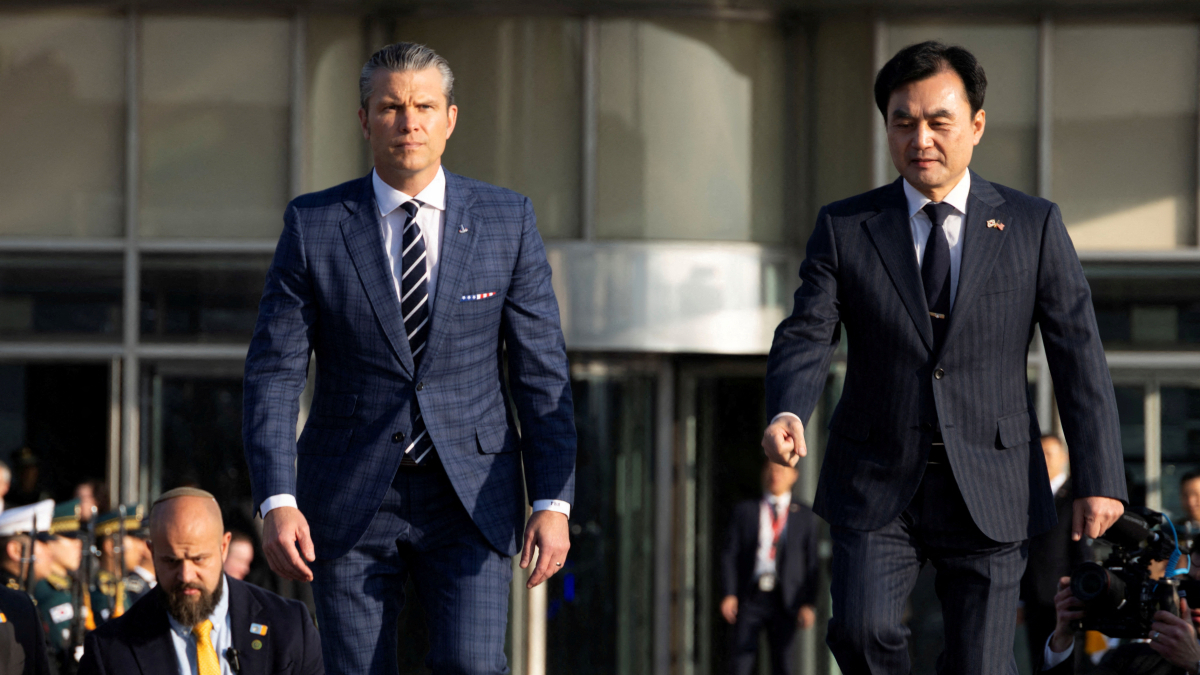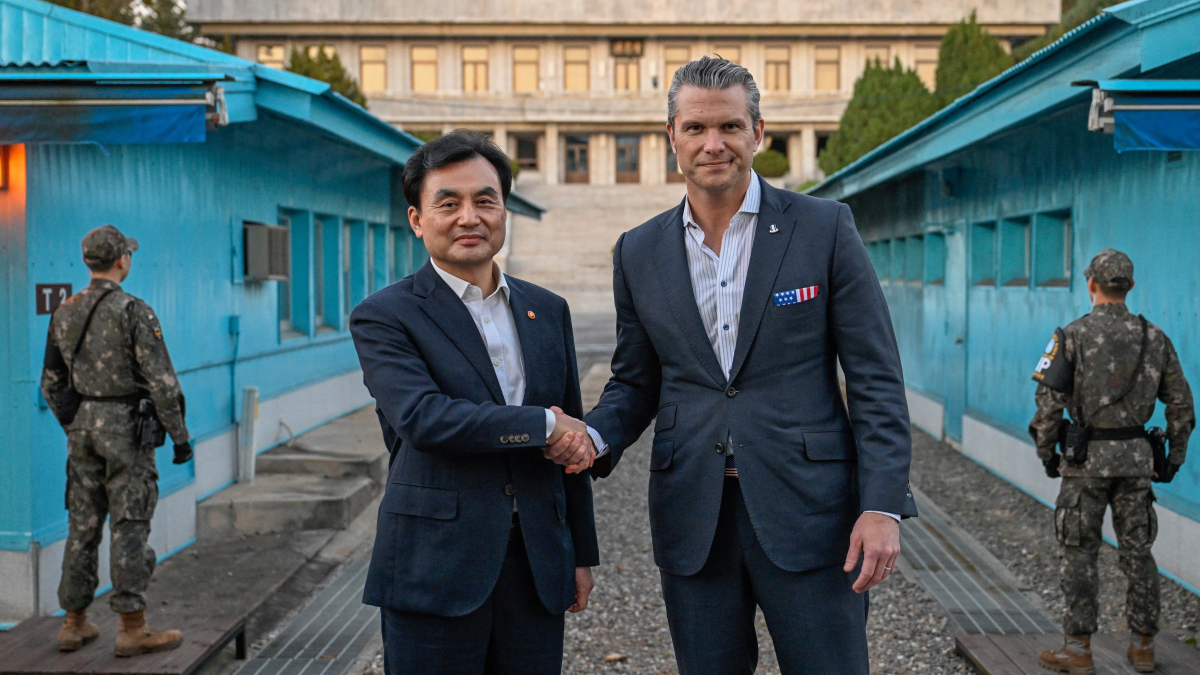Argentina and Uruguay approve Mercosur–EU free trade agreement
Argentina and Uruguay on Thursday became the first founding members of the Mercosur bloc to ratify a long-awaited free trade agreement with the Europe...

U.S. Defense Secretary Pete Hegseth said on Tuesday that Washington would explore "flexibility" for American troops stationed in South Korea to address regional threats while maintaining the alliance’s core focus on deterring North Korea.
Speaking at a joint press briefing in Seoul with South Korean Defence Minister Ahn Gyu-back, Hegseth said the two allies were discussing adjustments to their military cooperation as part of efforts to strengthen deterrence and adapt to a changing regional security landscape.
When asked whether the 28,500 U.S. troops stationed in South Korea could be used in operations beyond the Korean Peninsula, including potential conflicts involving China, Hegseth said that protecting against nuclear-armed North Korea remained the alliance’s central goal.
"But there's no doubt that flexibility for regional contingency is something we would take a look at," he said.
Hegseth confirmed that the two sides were working on a joint communique addressing defence costs, strategic cooperation, and South Korea’s growing military investments. The allies also agreed that South Korea would maintain and repair U.S. naval vessels, ensuring their readiness in the region.
U.S. President Donald Trump’s decision to back South Korea’s plan to build nuclear-powered submarines was also discussed. Hegseth said the move reflected Trump’s desire to strengthen capable allies.
"He wants our allies to have the best capabilities," he said. "And because Korea has been a model ally, he's open to opportunities like that, that ensure they have the best capabilities in their own defence and alongside us as allies."
Hegseth declined to comment on details of Trump’s approval. South Korean officials have said they could launch a nuclear-powered submarine by the mid-2030s if provided with fuel from the United States.
Addressing concerns that Seoul might pursue its own nuclear weapons, Ahn reaffirmed South Korea’s commitment to the Nuclear Non-Proliferation Treaty.
"Therefore, there will be no development of nuclear weapons in the Republic of Korea," he said.
Hegseth’s comments came a day after he visited the Demilitarised Zone (DMZ) separating the two Koreas, where he met South Korean troops and Defence Minister Ahn. The visit, which included a tour of the Panmunjom truce village, underscored what Ahn called the "symbolic and declarative" strength of the South Korea-U.S. alliance.

The two defence chiefs held their annual Security Consultative Meeting on Tuesday, the highest-level forum for charting the future of the alliance. Discussions focused on combined defence readiness, cyber and missile defence cooperation, and adapting joint strategies to what Seoul’s Defence Ministry described as a "changing security environment and threats." In this context, Washington says is considering adjustments to the regional role of U.S. forces to support stability in Asia amid concerns over shifting security dynamics in the South China Sea.
Seoul remains measured about expanding the mission of U.S. troops beyond the peninsula but continues to advance its own defence capabilities, including plans to assume wartime operational control of combined forces.
South Korea, which has about 450,000 active troops, is planning its largest defence budget increase in years in 2026, partly in response to Trump’s calls for U.S. allies to pay more for hosting American forces.
On Monday, the two countries’ Joint Chiefs of Staff met and reaffirmed their cooperation with other allies to safeguard Indo-Pacific security. South Korea’s Defence Ministry described the regional environment as "complex and unstable," noting that North Korea has continued to expand its nuclear and missile arsenal despite repeated offers of dialogue from Trump and President Lee Jae Myung.
A F-16 fighter jet of the Turkish Air Force crashed near a highway in western Türkiye early on Wednesday (25 February), killing its pilot, officials and media reports confirmed.
Chinese President Xi Jinping and German Chancellor Friedrich Merz agreed on Wednesday in Beijing to strengthen economic cooperation while addressing trade imbalances, market access concerns, and the war in Ukraine, during Merz’s first official visit to China since taking office.
U.S. President Donald Trump declared a “golden age” for America in his first second-term State of the Union on Tuesday evening, delivering the longest-ever address at more than 90 minutes. Here are the main takeaways.
President Donald Trump delivered the first State of the Union address of his second term to Congress on Wednesday (25 February), declaring that America’s “golden age” had begun and that the country was experiencing a “turnaround for the ages.”
Start your day informed with AnewZ Morning Brief. Here are the top news stories for the 25th of February, covering the latest developments you need to know.
A student from Azerbaijan was detained by U.S. immigration agents inside a Columbia University residential building on Thursday morning, was released later the same day after New York City Mayor Zohran Mamdani raised her case directly with President Donald Trump.
Argentina and Uruguay on Thursday became the first founding members of the Mercosur bloc to ratify a long-awaited free trade agreement with the European Union, paving the way for one of the world’s largest free trade zones.
Nuclear negotiations between the United States and Iran in Geneva have been described as “positive”, according to a report by Axios citing a U.S. official.
The United States is expected to deploy six additional aerial refuelling aircraft to Israel as Washington continues to strengthen its military presence in the Middle East while nuclear negotiations with Iran remain under way.
Former U.S. Secretary of State Hillary Clinton said on Thursday (26 February) that she had no information about the criminal activities of Jeffrey Epstein and urged lawmakers to question President Donald Trump under oath about the disgraced financier.
You can download the AnewZ application from Play Store and the App Store.

What is your opinion on this topic?
Leave the first comment